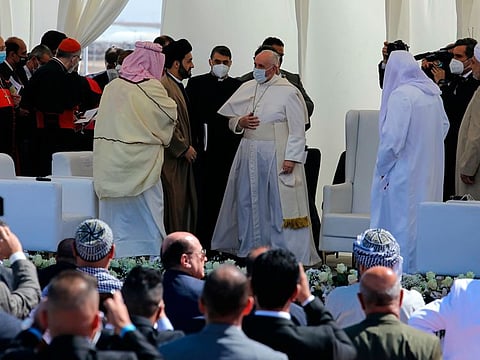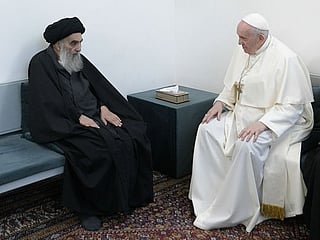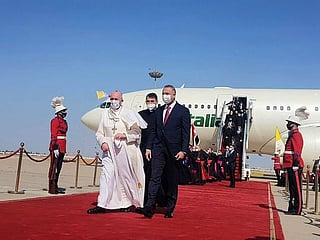Pope’s message of peace should be heeded by Iraqis and beyond
Papal visit should usher in a regional dialogue over universal values that unite people

It is ironic that the ancient land of Mesopotamia, which witnessed the birth of the father of the three monotheistic religions, has been marred by astringent ethno-sectarian conflicts for the last two decades.
Iraq, homeland to the oldest Christian sects, has become a battleground for religious extremists preaching intolerance in the most horrific ways as has been represented by Daesh.
Iraq’s Christian minority has paid a heavy price in the past few years where churches have been torched, congregations attacked and clerics kidnapped and killed. But the suffering was not exclusive to Christians. Other religious and ethnic sects were also targeted including Arab Sunnis, Yazidis, Kurds and Shiites.
Failing to stem the tide
This is why when politicians and key state actors continue to fail to stem the tide of intolerance and sectarian violence — leaving Iraq with its rich heritage and unique contribution to human civilisation at the mercy of bigots who abuse religion — that the historic visit of Pope Francis this week to Iraq delivers a much needed message of healing and peace.
Despite health and security risks the 84-year-old pontiff has decided to emerge from a year of lockdown and chose Iraq, an injured country, to be the destination of his papal visit.
In his public statement the Pope urged Muslims to embrace their Christian neighbours as a precious resource that is essential to preserve the country’s diversity which had been its hallmark for hundreds of years.
It is no secret that Iraq’s Christian population had dwindled since the US invasion of 2003; an event that heralded years of chaos, plundering, sectarian conflicts and unimaginable crimes against people and holy places of all denominations.
A more humane world
“Only if we learn to look beyond our differences and see each other as members of the same human family,” Francis told Iraqi authorities in his welcoming address, “will we be able to begin an effective process of rebuilding and leave to future generations a better, more just and more humane world.”
The visit offers the embattled government of Prime Minister Mustapha Kadhimi a much needed moral boost as it finds itself fighting a spike in coronavirus cases, a state of lawlessness, a resurge in Daesh threats, internal bickering among key politicians and a showdown between the US and pro-Iran militias.
President Barham Saleh was keen to underline his rejection of terrorism in the name of religion; a message that should echo across Iraq. The highlight of the three-day visit was Saturday’s visit by the Pope to the Grand Ayatollah Ali Al-Sistani in Najaf; a courageous move by the pontiff in offering the hugely influential cleric an olive branch and stressing the message of coexistence.
In response Sistani affirmed that religious authorities have a role in protecting Iraq’s Christians and said they should live in peace and enjoy the same rights as other Iraqis. Perhaps the most important unifying message was the need for peace and the rejection of religious bigotry.
Iraqis from all walks of life have suffered over the past years and the country continues to face a myriad of existential challenges. It sorely needs internal unity and national healing that begins with embracing the codes of coexistence, diversity and religious tolerance.
It also needs to move towards setting the tenets for a civil state that ensures equality under the law for all its citizens. Instead of entrenchment, Iraqi politicians must shun the politics of divisions and embrace the peoples’ main concerns such as their rights to work, education, health, electricity and clean water, while protecting their religious beliefs.
The Pope’s message of peace must also resonate across the region. Minorities have paid a dear price as conflicts in Iraq, Syria, Lebanon and Libya erupted. The rogue groups like Daesh must never be allowed to take roots again.
Also the superpowers and regional actors that have played havoc with this region’s stability and security must distance themselves from interfering in the internal affairs of the region’s countries.
The Pope’s visit should usher in a nationwide dialogue over the universal values that unite people. Inter-faith discussions should underline these common values that are shared by citizens of one nation. Enough blood has been shed and many innocent people have been displaced, kidnapped and killed while holy places plundered and destroyed.
This is a crucial moment in Iraq’s history and while the Pope paid homage to the birthplace of Prophet Abraham in Ur, we should be reminded of the fact that we have more in common as followers of various faiths than we think.
The message of peace should be heeded by Iraqis and beyond as one that brings hope rather than despair and optimism for a better future rather than the fatalistic and false promise of extremists.
Osama Al Sharif is a journalist and political commentator based in Amman.






